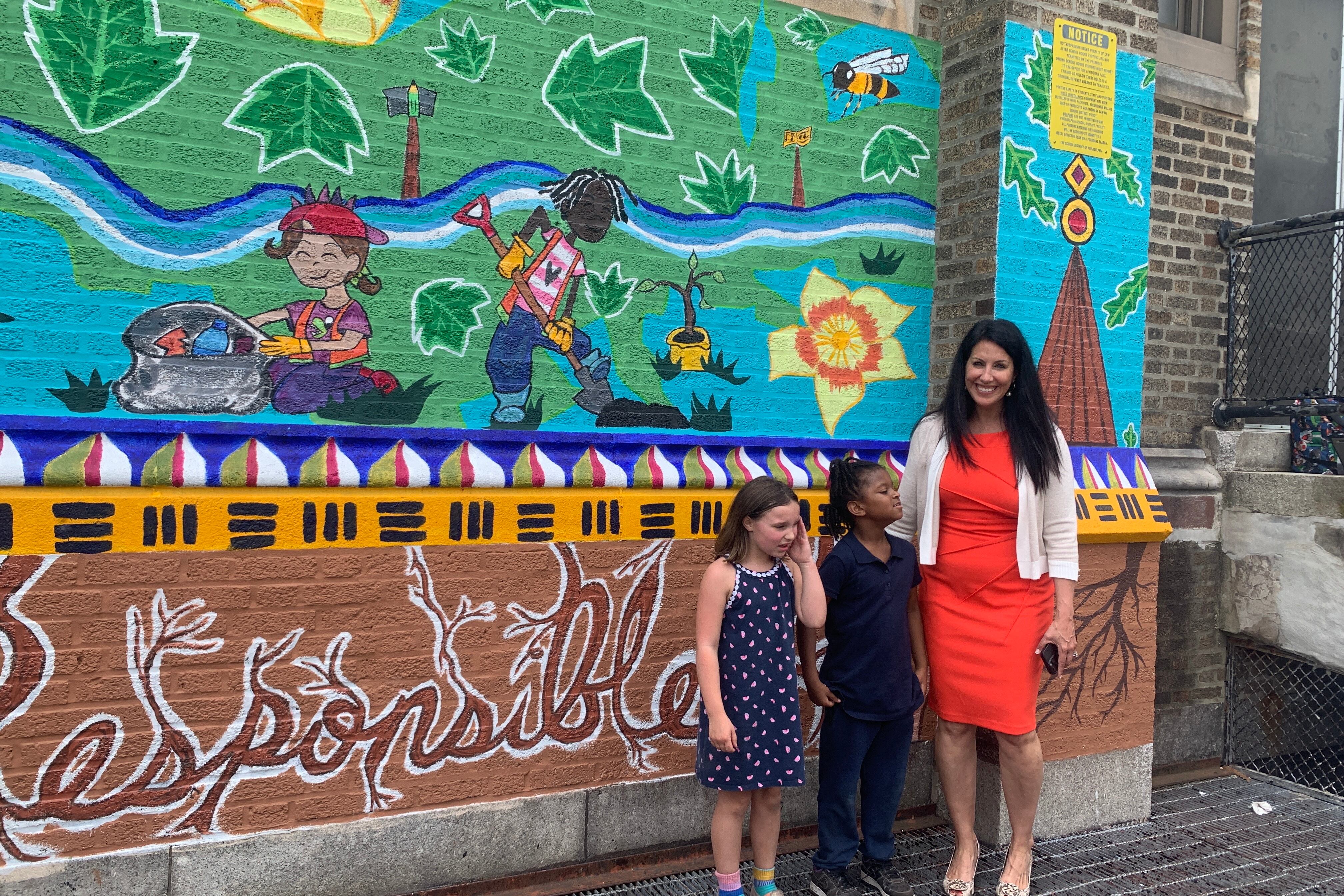Corinne Scioli remembers the moment she was sold on the International Baccalaureate program.
She was the assistant principal at Northeast Philadelphia’s Mayfair Elementary School, which educates almost 2,000 students and is the largest elementary school in the city. Its families come from more than 60 countries.
A few years ago, a first grader from Brazil “who spoke not a lick of English” showed up at Mayfair. Scioli, whose native language is Spanish and was once an English language learner in the U.S. herself, could make do in Brazilian Portuguese. So she communicated with the boy about his class homework assignment to make an object from recycled materials.
The assignment was a quintessential example of International Baccalaureate, also known as IB, a curriculum program that relies on a strategy of “learning by doing” while promoting cultural understanding and global awareness among students. In 2018, Mayfair became the first elementary school in the city to adopt the IB curriculum.
The boy came in the next day carrying a robot he had made from plastic water bottles and a shoebox. The boy had immediately engaged and was able to participate in school, despite the language barrier and the newness of his surroundings. For Scioli, “It was confirmation that the approach works.”
Scioli, 50, is now the principal of J.S. Jenks Academy of the Arts and Sciences, which is on track to become the second elementary school in the city to adopt the IB program and its demanding, project-based curriculum. Jenks received approval in April to be an IB candidate school for grades K-5, which means it has a year to explore its goals and refine its practices before seeking full IB authorization. Adopting IB also matches Superintendent Tony Watlington’s goal to accelerate academic achievement, and it’s one of the programs that he included in his five-year strategic plan, which was recently approved by the city Board of Education.
In a statement to Chalkbeat, district spokesperson Marissa Orbanek emphasized the IB program’s emphasis on “research and critical thinking skills, knowledge acquisition, and global awareness.” The statement also pointed out the strategic plan’s goal to provide students with “equitable access” to course offerings that are “more aligned with their interests, are relevant to their lives, and prepare them for their future.”
Although located in predominantly white and well-off Chestnut Hill, Jenks’ student body today is 81% Black, and most students come from low-income backgrounds. Just a third of the student body lives within the Jenks catchment.
Jenks, a K-8 school which enrolls about 420 students, is transitioning to the IB program on its 100th anniversary; it was built in 1923 on Germantown Avenue in Chestnut Hill and has served students ever since.
The IB curriculum is organized around six interdisciplinary themes: who we are, how we organize ourselves, how we express ourselves, where we are in place and time, how the world works, and sharing the planet. Jenks said the program also promotes social-emotional learning in addition to academics. And through the program, students will be able to take classes in a foreign language.
The IB program “follows a student inquiry cycle,” Scioli said. “They’re invited to think deeper and to be advocates for social and environmental justice. It puts that at the forefront.” In short, Scioli said IB’s framework “promotes everything I believe in.”
For elementary school students, “we want to encourage them to be hands-on learners and constructors of their own knowledge,” she said. Teachers will undergo extensive training so they can support this mission.
“This takes us to the next level,” she said.
Scioli recalls teaching her grandfather to write his name
The program’s global outlook resonates with Scioli for personal as well as professional reasons.
Although she was born on an Air Force base in Omaha, Nebraska, Scioli spent first and second grades in Panama, where her father was from. When she returned to the U.S. at the end of second grade, she had trouble with reading and writing English at grade level.
“In those days, instead of viewing bilingualism as an asset, many schools put foreign students who were learning English in special education classes,” Scioli recalled. But her father insisted that Scioli would not go to special education classes. Thanks in part to tutoring, her love of reading evolved from “Charlotte’s Web” to Shakespeare, all the way to an undergraduate degree in women’s studies and a master’s degree in education from the University of Pennsylvania.
Scioli also traces her path to becoming an educator to a time when she traced letters in the ground during a visit to the Dominican Republic to see her maternal grandfather, who was illiterate. Using a stick, she spelled out his name in the soil at the family farm. He then followed suit, and called the moment he learned how to write his name “incredible.”
“It was my introduction to being an educator, and it stuck,” she said.
She hopes to eventually receive approval for IB’s Middle Years Program for grades 6-8. According to the district eight schools currently offer IB programs: six high schools, two middle schools as well as Mayfair. Thurgood Marshall Middle school is also in the candidacy process.
“I want to create the same level of cultural awareness” that now exists at Mayfair, she said, “and help students to think critically, work with their hands as well as their minds, and help us all understand how to connect.”
Dale Mezzacappa is a senior writer for Chalkbeat Philadelphia, where she covers K-12 schools and early childhood education in Philadelphia. Contact Dale at dmezzacappa@chalkbeat.org.






